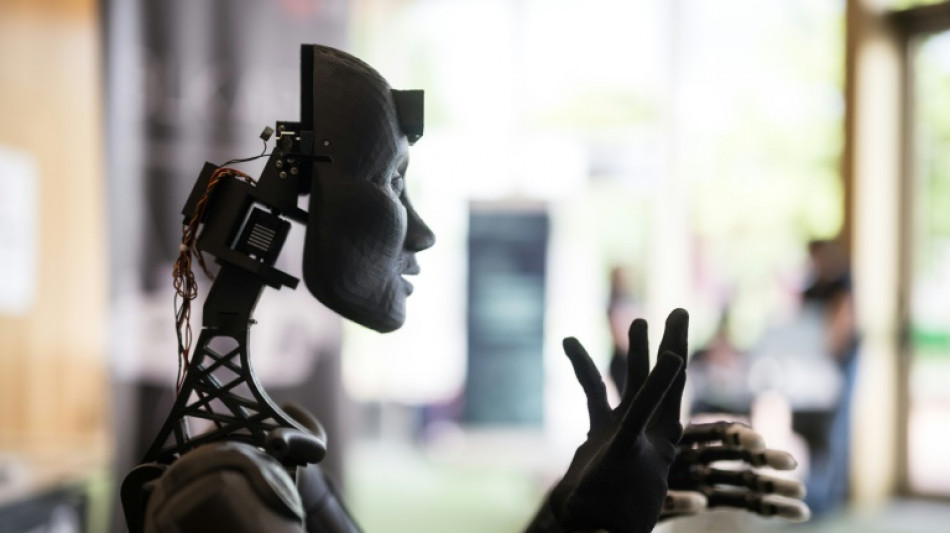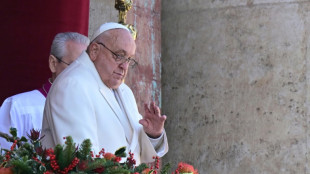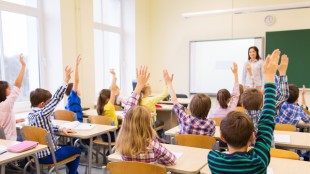
-
 Syrians protest after video of attack on Alawite shrine
Syrians protest after video of attack on Alawite shrine
-
Russian state owner says cargo ship blast was 'terrorist attack'

-
 38 dead as Azerbaijani jet crashes in Kazakhstan
38 dead as Azerbaijani jet crashes in Kazakhstan
-
Crisis-hit Valencia hire West Brom's Corberan as new boss

-
 Suriname ex-dictator and fugitive Desi Bouterse dead at 79
Suriname ex-dictator and fugitive Desi Bouterse dead at 79
-
35 feared dead as Azerbaijani jet crashes in Kazakhstan

-
 Pope calls for 'arms to be silenced' in Christmas appeal
Pope calls for 'arms to be silenced' in Christmas appeal
-
Syria authorities say torched 1 million captagon pills

-
 Pope calls for 'arms to be silenced' across world
Pope calls for 'arms to be silenced' across world
-
32 survivors as Azerbaijani jet crashes in Kazakhstan

-
 Pakistan air strikes kill 46 in Afghanistan, Kabul says
Pakistan air strikes kill 46 in Afghanistan, Kabul says
-
Liverpool host Foxes, Arsenal prepare for life without Saka

-
 Japan FM raises 'serious concerns' over China military buildup
Japan FM raises 'serious concerns' over China military buildup
-
Pope's sombre message in Christmas under shadow of war

-
 Zelensky condemns Russian 'inhumane' Christmas attack on energy grid
Zelensky condemns Russian 'inhumane' Christmas attack on energy grid
-
Sweeping Vietnam internet law comes into force

-
 Pope kicks off Christmas under shadow of war
Pope kicks off Christmas under shadow of war
-
Catholics hold muted Christmas mass in Indonesia's Sharia stronghold

-
 Japan's top diplomat in China to address 'challenges'
Japan's top diplomat in China to address 'challenges'
-
Thousands attend Christmas charity dinner in Buenos Aires

-
 Demand for Japanese content booms post 'Shogun'
Demand for Japanese content booms post 'Shogun'
-
As India's Bollywood shifts, stars and snappers click

-
 Mystery drones won't interfere with Santa's work: US tracker
Mystery drones won't interfere with Santa's work: US tracker
-
Djokovic eyes more Slam glory as Swiatek returns under doping cloud

-
 Australia's in-form Head confirmed fit for Boxing Day Test
Australia's in-form Head confirmed fit for Boxing Day Test
-
Brazilian midfielder Oscar returns to Sao Paulo

-
 'Wemby' and 'Ant-Man' to make NBA Christmas debuts
'Wemby' and 'Ant-Man' to make NBA Christmas debuts
-
US agency focused on foreign disinformation shuts down

-
 On Christmas Eve, Pope Francis launches holy Jubilee year
On Christmas Eve, Pope Francis launches holy Jubilee year
-
'Like a dream': AFP photographer's return to Syria

-
 Chiefs seek top seed in holiday test for playoff-bound NFL teams
Chiefs seek top seed in holiday test for playoff-bound NFL teams
-
Panamanians protest 'public enemy' Trump's canal threat

-
 Cyclone death toll in Mayotte rises to 39
Cyclone death toll in Mayotte rises to 39
-
Ecuador vice president says Noboa seeking her 'banishment'

-
 Leicester boss Van Nistelrooy aware of 'bigger picture' as Liverpool await
Leicester boss Van Nistelrooy aware of 'bigger picture' as Liverpool await
-
Syria authorities say armed groups have agreed to disband

-
 Maresca expects Man City to be in title hunt as he downplays Chelsea's chancs
Maresca expects Man City to be in title hunt as he downplays Chelsea's chancs
-
Man Utd boss Amorim vows to stay on course despite Rashford row

-
 South Africa opt for all-pace attack against Pakistan
South Africa opt for all-pace attack against Pakistan
-
Guardiola adamant Man City slump not all about Haaland

-
 Global stocks mostly higher in thin pre-Christmas trade
Global stocks mostly higher in thin pre-Christmas trade
-
Bethlehem marks sombre Christmas under shadow of war

-
 NASA probe makes closest ever pass by the Sun
NASA probe makes closest ever pass by the Sun
-
11 killed in blast at Turkey explosives plant

-
 Indonesia considers parole for ex-terror chiefs: official
Indonesia considers parole for ex-terror chiefs: official
-
Global stocks mostly rise in thin pre-Christmas trade

-
 Postecoglou says Spurs 'need to reinforce' in transfer window
Postecoglou says Spurs 'need to reinforce' in transfer window
-
Le Pen says days of new French govt numbered

-
 Global stocks mostly rise after US tech rally
Global stocks mostly rise after US tech rally
-
Villa boss Emery set for 'very difficult' clash with Newcastle


Will AI one day win a Nobel Prize?
Artificial intelligence is already disrupting industries from banking and finance to film and journalism, and scientists are investigating how AI might revolutionise their field -- or even win a Nobel Prize.
In 2021, Japanese scientist Hiroaki Kitano proposed what he dubbed the "Nobel Turing Challenge", inviting researchers to create an "AI scientist" capable of autonomously carrying out research worthy of a Nobel Prize by 2050.
Some scientists are already hard at work seeking to create an AI colleague worthy of a Nobel, with this year's laureates to be announced between October 7 and 14.
And in fact, there are around 100 "robot scientists" already, according to Ross King, a professor of machine intelligence at Chalmers University in Sweden.
In 2009, King published a paper in which he and a group of colleagues presented "Robot Scientist Adam" -- the first machine to make scientific discoveries independently.
"We built a robot which discovered new science on its own, generated novel scientific ideas and tested them and confirmed that they were correct," King told AFP.
The robot was set up to form hypotheses autonomously, and then design experiments to test these out.
It would even program laboratory robots to carry out those experiments, before learning from the process and repeating.
- 'Not trivial' -
"Adam" was tasked with exploring the inner workings of yeast and discovered "functions of genes" that were previously unknown in the organism.
In the paper, the robot scientist's creators noted that while the discoveries were "modest" they were "not trivial" either.
Later, a second robot scientist -- named "Eve" -- was set up to study drug candidates for malaria and other tropical diseases.
According to King, robot scientists already have several advantages over your average human scientist.
"It costs less money to do the science, they work 24/7," he explained, adding that they are also more diligent at recording every detail of the process.
At the same time, King conceded that AI is far from being anywhere close to a Nobel-worthy scientist.
For that, they would need to be "much more intelligent" and able to "understand the bigger picture".
- 'Nowhere near' -
Inga Strumke, an associate professor at the Norwegian University of Science and Technology, said that for the time being the scientific profession is safe.
"The scientific tradition is nowhere near being taken over by machines anytime soon," she told AFP.
However, Strumke added that "doesn't mean that it's impossible", adding that it's "definitely" clear that AI is having and will have an impact on how science is conducted.
One example of how it is already in use is AlphaFold -- an AI model developed by Google DeepMind -- which is used to predict the three-dimensional structure of proteins based on their amino acid.
"We knew that there was some relation between the amino acids and the final three-dimensional shape of the proteins... and then we could use machine learning to find it," Strumke said.
She explained that the complexity of such calculations was too daunting for humans.
"We kind of have a machine that did something that no humans could do," she said.
At the same time, for Strumke, the case of AlphaFold also demonstrates one of the weaknesses of current AI models such as so-called neural networks.
They are very adept at crunching massive amounts of information and coming up with an answer, but not very good at explaining why that answer is correct.
So while the over 200 million protein structures predicted by AlphaFold are "extremely useful", they "don't teach us anything about microbiology", Strumke said.
- Aided by AI -
For her, science seeks to understand the universe and is not merely about "making the correct guess".
Still, the groundbreaking work done by AlphaFold has led to pundits putting the minds behind it as front-runners for a Nobel Prize.
Google DeepMind's director John Jumper and CEO and co-founder Demis Hassabis were already honoured with the prestigious Lasker Award in 2023.
Analytics group Clarivate, which keeps an eye on potential Nobel science laureates, places the pair among the top picks for the 2024 candidates for the Prize in Chemistry, announced on October 9.
David Pendlebury, head of the research group, admits that while a 2021 paper by Jumper and Hassabis has been cited thousands of times, it would be out of character for the Nobel jury to award work so quickly after publication -- as most discoveries that are honoured date back decades.
At the same time, he feels confident that it won't be too long before research aided by AI will win the most coveted of science prizes.
"I'm sure that within the next decade there will be Nobel Prizes that are somehow assisted by computation and computation these days is more and more AI," Pendlebury told AFP.
A.Rodriguezv--AMWN


